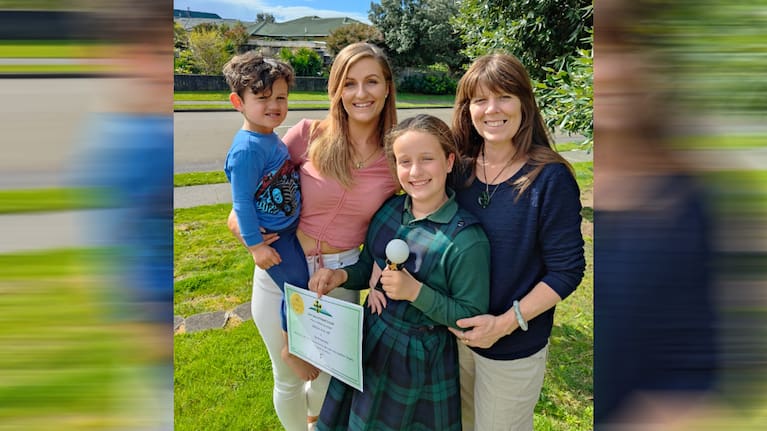Joan Ashcroft, age 54 and of Paraparaumu, had been a teacher "for donkey's years", according to her son Daniel.
Now, after a life-changing and possibly terminal diagnosis, Daniel wants to make sure she gets the help she needs and lives to meet his first child, who is due next month.
In early 2021 Joan was diagnosed with a non-fluent variant of primary progressive aphasia (PPA), a neurodegenerative disease that affects cognition and the ability to speak.
The discovery was unexpected and came after after Joan's family noticed changes in her communication, shifts that she kept to herself for several months.
"She noticed a bit of a change in her speech, but was able to carry on and hide it from everyone," Daniel told 1News.
"As it started progressing we started noticing she'd miss certain words. When we asked her how long it had been going on for, she said 'about a year'.
"Typical Kiwi attitude, isn't it? We were all shocked."

At least 17,000 Kiwis suffer from the disease - possibly closer to 20,000 - it can progress into deadly dementia-like symptoms, and it is currently without a cure.
"Eventually it's a terminal thing, so it causes atrophy, shrinking of the brain," Daniel said.
"She's super young, she's only 54. There's no family history, there's nothing. Everyone else in her support group are [largely] in their late 70s, 80s... she's quite a stand-out case."
Though cureless, aphasia can be treated with stem cells, which can help regrowth tissue in Joan's brain and may even be more effective given her younger body.
However it's incredibly expensive, and the specific treatment she needs - involving mesenchymal stem cells (MSCs) transplanted from bone marrow - is not available in New Zealand.
She will need to travel to the US to receive care, a single session costing $42,000 - and she may need more than one.
Daniel created a Givealittle page three weeks ago to fund Joan's treatment, so far raising $23,000 as of June 6.
"The donations we've had from people, it's quite amazing, it's humbling," he said.
"She goes through [the donor list] every time, wanting to know the full name of the person that donated so she can get their details and try and reach them. It's been quite a positive point in a s***** situation."

Living with non-fluent aphasia
Today, Joan's speech is "quite broken" and she can only speak a few words at a time.
At the moment Joan cannot teach, but her school, Our Lady of Kāpiti, has supported her by having her work part-time in the library.
"She used to be quite the social outgoing person, but now she's not of course 'cause she doesn't conversate with people well," Daniel said.
"She puts on a brave face, but she definitely keeps to herself a lot more. I think she's found it quite hard on her mental health. She sort of feels ripped off, I guess."
The past few years have forced the Ashcrofts to reflect on where New Zealand puts funding treatments, especially for uncommon diseases without cures.
"In this position you realise how unfair it is that one disease is funded, then another's not, y'know what I mean? How can we decide [that] for people? It should all be funded and taken care of, the financial strain that adds on to things is quite significant," Daniel said.
He is hopeful that his mum will recover and will return to being the teacher and social butterfly she was just a few short years ago.
"Through enhanced quality of life Joan will be able to continue to be the most selfless and loving person while enjoying quality time with family and friends," Daniel wrote on Joan's Givealittle page.
"If anyone deserves a chance then this is your person (sic)."



















SHARE ME